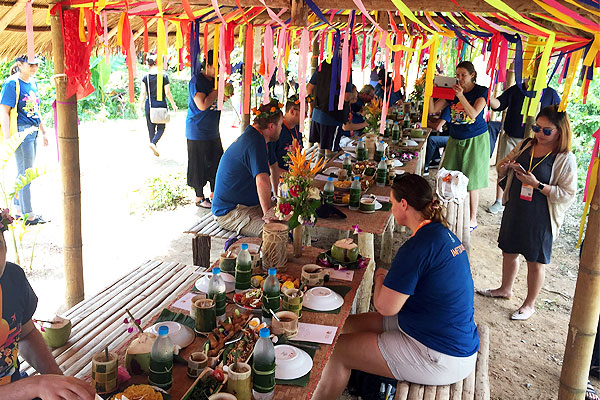The social distancing restrictions have massively affected events around the world. Individuals can no longer gather physically in one place. As a result, food and wine festivals companies have begun thinking about restructuring their formats using technology.
The COVID-19 that hit the world in 2020 has affected many sectors. One of the sectors that were greatly affected is the travel and tourism industry. Many travel destinations had to introduce travel restrictions to mitigate the spread of the virus. Fortunately, the situation is positively changing in many regions. However, there are still many uncertainties about the pandemic and social distancing restrictions.
Gastronomy Tourism
Gastronomy tourism has also been massively affected by the lack of travel. It is apparent that the gastronomic tourism experience is emotional and physical. It usually entails tasting local food and recipes and participating in other food-related activities. For instance, you could visit food and wine production sites, cooking classes, and food-theme events.
However, with travel restrictions, all these experiences are not possible. In this sense, technology has been used extensively to exploit the tourist experience. For example, there are touch screens and virtual reality and augmented reality in wineries.
These technological innovations boost your pre and on-site visits. As a result, it makes your experience distinct and more valuable hence promoting a dynamic co-operation process. The emerging technology-based concepts in gastronomy tourism include:
- Online cooking classes and courses.
- Remote partying and social dining.
- AR and VR experiences for e-wine and e-food destinations.
- Agri-crowdsourcing.
- Supportive e-experiences.
Several destinations are exploiting these ideas. They aim to create home-based experiences and virtually engage their customers to inspire them for future visits.
Digital Home-Based Gastronomy Tourism
Technology In The Foodservice Sector
The tourism industry is using technology to create home-based experiences. For example, the temporary closure of restaurants saw the rise of online cooking sessions and tutorials and digital home-dining experiences.
For example, a restaurant in Italy came up with a digital dining concept accompanied by the delivery of traditional foods. The restaurant allows its customers to interact with the chef virtually as he introduces them to recipes. On the other hand, the restaurant staff take the
customers through a digital wine tasting and pairing.
Moreover, there are also travel companies innovating gastronomy tourism. These tour operators have developed virtual food tours. They also make the experience more authentic by offering deliveries from three restaurants to their client's homes.
These virtual tours allow customers to watch and listen to the narratives of local owners, offering them a chance to learn about gastronomic traditions and recipes.
Technology Is Production Sites
There are emerging trends in food technology. In this regard, food and wine production sites have embraced technological innovations to offer distinctive home-based experiences. For instance, wineries are moving towards digital wine tasting.
Digital tasting involves companies explaining to their clients the organoleptic characteristics of each wine. This shows how technology has offered these companies a different way of engaging their clients.
The social distancing restrictions have also seen innovations developed years back turn into a great success. The production sites have also partnered with media services to spice up their digital experiences. For instance, they accompany the digital tasting with music that inspires wine and its flavors.
Gastronomic Events
The social distancing restrictions have massively affected events around the world. Individuals can no longer gather physically in one place. As a result, food and wine festivals companies have begun thinking about restructuring their formats using technology.
Event organizers have teamed up with food and wine companies to enable participants to celebrate gastronomic events remotely. For instance, some companies use channels such as Facebook live services to host live tasting events with participants.
If you are into food tourism and can't travel to Italy or your favorite food tourism destination, you should start looking online for events. The events also allow participants to pre-order foods and wines which are delivered to their homes.
What Does The Future Hold?
There are new opportunities created by the use of technology in gastronomy tourism. Technology has become instrumental in the tourism sector, especially in a season where travel restrictions are in place.
In this regard, suppliers of gastronomy tourism such as wineries, farms, restaurants, and event organizers struggle to come up with home-based experiences. These experiences enable the suppliers to maintain relationships with their clients and motivate them to visit their sites later.
The suppliers are now using live guided tasting, online cooking classes, and virtual tours to overcome the current challenges. Other interventions include remote social eating and drinking. So, will these interventions last past the social distancing period?
Well, some experts argue that some of the interventions could have a permanent impact on gastronomy tourism. For example, suppliers will shift from thinking about products and services and focus more on the whole experience. This approach will allow them to consider how
technology can change the tourism ecosystem.
Additionally, gastronomy tourism suppliers will also have to engage travelers in the process of designing and developing remote experiences. In the end, the gastronomy tourism industry will be totally different once the COVID-19 dust settles.
Tatiana is the news coordinator for TravelDailyNews Media Network (traveldailynews.gr, traveldailynews.com and traveldailynews.asia). Her role includes monitoring the hundreds of news sources of TravelDailyNews Media Network and skimming the most important according to our strategy.
She holds a Bachelor's degree in Communication & Mass Media from Panteion University of Political & Social Studies of Athens and she has been editor and editor-in-chief in various economic magazines and newspapers.















































































































































































































